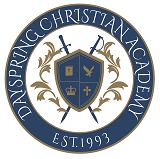Children are a heritage of the Lord, and parents are instructed to bring them up in the nurture and admonition of the Lord. The responsibility for laying the foundation of the Christian life rest upon the parents to whom children have been entrusted by God. (Proverbs 22:6) As Christian parents seek to fulfill this relationship that God has established with believers and their children, the Christian school becomes an extension of the home and assists parents in fulfilling their responsibility to educate their children. The Christian school expands the children’s horizons, deepens their insight, improves their abilities and guides them along the paths that lead to Godly knowledge.
The philosophy of education of Dayspring Christian Academy is based on God as the foundation of all knowledge. The Bible teaches us that “the fear of the Lord is the beginning of knowledge.” (Proverbs 1:7) The knowledge of God that is unique to Christian education is a personal knowledge that begins with faith in Jesus Christ and develops through the agencies of Christian education: the scriptures, the leadership of Godly teachers and a Biblically based curriculum.
The Bible is the center of the Christian School curriculum and all subjects provide a knowledge of God’s nature and His work in the world. For example, in science, students study God’s laws for the universe; in history, they see the unfolding of God’s plan for the ages and the redemption of His people; in literature, they learn to test other writers by Christian standards, so they will appreciate what is good, true, and beautiful, and discern what is false or dishonoring to God; in government, they learn that true government is ordained of God and requires loyalty and support; also, they learn the principles of honesty, decency, cooperation, and fair play which promote Godliness of character and conduct. (II Timothy 2:15)
Academic subjects are studied not as ends in themselves, but “that the man of God may be perfect, thoroughly furnished unto all good works.” ( II Timothy 3:17) The education of the child of God must include both the personal knowledge of God and the preparation for exercising that knowledge in service for the Lord.
